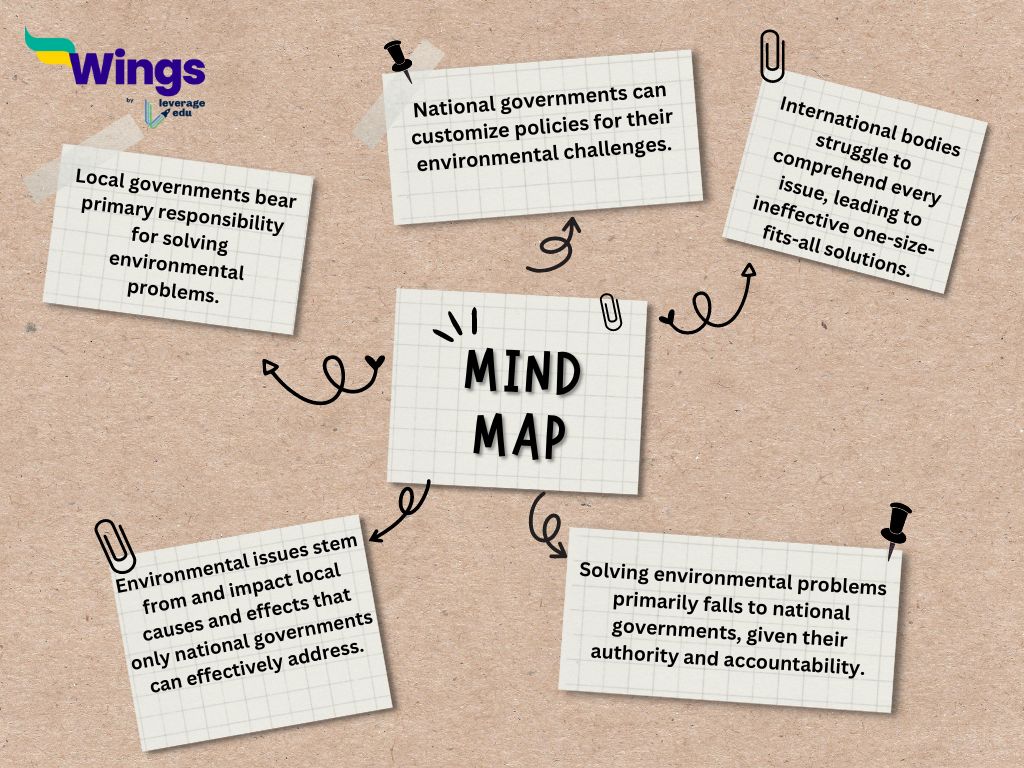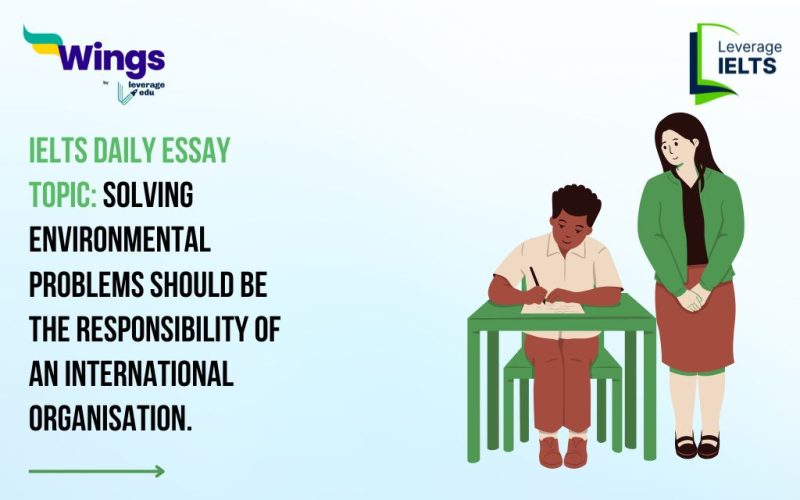Brainstorming Ideas
a) I firmly disagree that it is the responsibility of international organisations to solve environmental problems. It is the primary responsibility of the local government as they are directly accountable to their citizens.
b) Even though environmental issues are global as well, they have local causes and effects that can only be addressed by national governments.
c) National governments can make policies that reflect their unique environmental challenges, while on the other hand, international governments lack the power to ensure that all of the policies they are forming are implemented or not.
d) Apart from that, they are not able to fully understand every problem leading to the formation of one-size-fits-all solutions that will not be effective, while the national governments are sovereign entities having more freedom.
e) To conclude, while international organisations have a role to play in solving environmental problems the primary responsibility lies with the national governments as they have authority, accountability and the capacity to effectively address environmental issues within their borders.

Q. Solving environmental problems should be the responsibility of an international organisation rather than each national government. Do you agree or disagree?
Ans: The statement that solving environmental problems is the responsibility of international organisations rather than the national government is a topic of debate. I firmly disagree with this, as even though international organisations have some role to play, the primary responsibility is of the national government only as they are directly accountable to their citizens and can mobilize local resources and increase public participation.
Although Environmental problems are global, they often have local causes and effects that can only be addressed by national governments. They are the closest to the issue, so they have the best potential to understand and address it. They can form policies that reflect their unique environmental challenges and socio-economic context. For example, a country that has abundant forests might prevent deforestation, while a country that has high industrial output might prioritise the reduction of air pollution. Moreover, national governments are directly answerable to their citizens and have a direct right to hold them responsible for the increase in environmental problems. This accountability helps governments to take these issues seriously and make big decisions.
While international governments play a crucial role in facilitating cooperation and setting global standards, they often lack the power to ensure that all of the policies they are forming are implemented or not. They may also not be able to fully grasp the specific circumstances and complexities of each country, leading to the formation of one-size-fits-all solutions that will not be effective. Furthermore, international organizations are often hampered by political considerations and disagreements among various countries’ members, which can slow down decision-making and implementation of environmental initiatives. On the other hand, national governments are sovereign entities, having a greater freedom to act decisively and swiftly in response to environmental crises.
To conclude, while international organisations have a role to play in solving environmental problems, the primary responsibility lies with the national governments. They have the authority, accountability and the capacity to effectively address environmental issues within their borders.
Analysis
Paraphrased Statement: The statement that solving environmental problems is the responsibility of international organisations rather than the national government is a topic of debate.
Thesis Statement: I firmly disagree with this, as even though international organisations have some role to play, the primary responsibility is of the national government only as they are directly accountable to their citizens and can mobilize local resources and increase public participation.
Body Paragraph 1-Topic Sentences: Although Environmental problems are global, they often have local causes and effects that can only be addressed by national governments. They are the closest to the issue, so they have the best potential to understand and address them.
Body Paragraph 1- Supporting Reasons and Explanations: They can form policies that reflect their unique environmental challenges and socio-economic context. For example, a country that has abundant forests might prevent deforestation, while a country that has high industrial output might prioritise the reduction of air pollution. Moreover, national governments are directly answerable to their citizens and have a direct right to hold them responsible for the increase in environmental problems. This accountability helps governments to take these issues seriously and make big decisions.
Body Paragraph 2- Topic sentence: While international governments play a crucial role in facilitating cooperation and setting global standards, they often lack the power to ensure that all of the policies they are forming are implemented or not.
Body paragraph 2- Supporting Reasons and Explanations: They may also not be able to fully grasp the specific circumstances and complexities of each country, leading to the formation of one-size-fits-all solutions that will not be effective. Furthermore, international organizations are often hampered by political considerations and disagreements among various countries’ members, which can slow down decision-making and implementation of environmental initiatives. On the other hand, national governments are sovereign entities, having a greater freedom to act decisively and swiftly in response to environmental crises.
Conclusion: To conclude, while international organisations have a role to play in solving environmental problems, the primary responsibility lies with the national governments. They have the authority, accountability and the capacity to effectively address environmental issues within their borders.
Vocabulary in Use
| Word | Meanings |
| Accountable | Being responsible and answerable. |
| Mobilize | To prepare or organize for a purpose. |
| Local causes and effects | The relationship between local events where one leads to another. |
| Addressed by | Spoken or written to by someone. |
| Abundant | More than enough; plentiful. |
| Prioritise | Deciding the importance of tasks to handle them effectively. |
| Facilitating cooperation | Making teamwork easier or possible. |
| Answerable | Responsible or liable. |
| Crucial role | An extremely important part. |
| Fully grasp | Completely understand something. |
| Hampered | Hindered or obstructed. |
| Sovereign entities | Independent and self-governing states. |
Linkers and Connectors Used
Following are the linkers and connectors used:
- Although
- For example
- Moreover
- While
- Furthermore
- On the other hand
- To conclude
Are you preparing for IELTS? Check out this video to improve your writing skills for the IELTS exam given below👇.
| Related Blogs | ||
| IELTS Eligibility: IELTS Exam Age Limit & Qualification | IELTS Exam Dates, Registration, Result, Preparation | IELTS Sample Tests: PDF (Download), Exam Pattern |
| IELTS Marking Scheme | IELTS Scoring System & Grading | IELTS Test Centres in India | IELTS Syllabus & Section-Wise Exam Pattern |
Download the Leverage IELTS App today.


Need help preparing for IELTS? Check out the best IELTS preparation courses in the market offered in a live training environment by trusted educators. If you want to help studying abroad, call 1800572130.


 One app for all your study abroad needs
One app for all your study abroad needs












 60,000+ students trusted us with their dreams. Take the first step today!
60,000+ students trusted us with their dreams. Take the first step today!